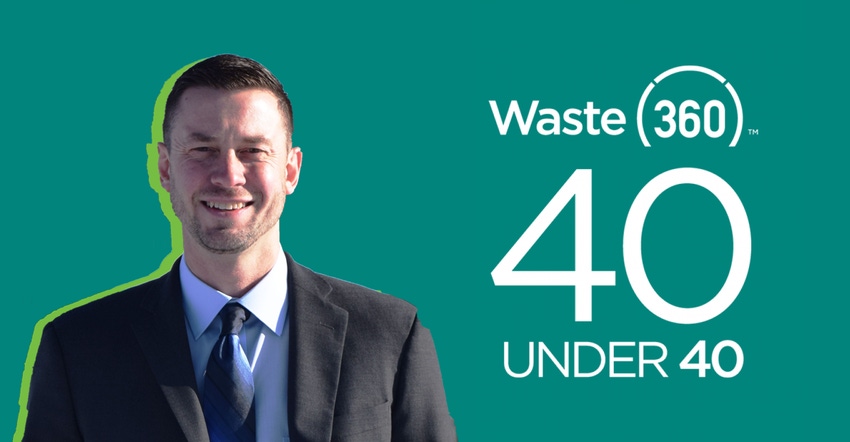Casella's Jason Mead Excels at Creating a Sustainable Recycling Model

Following a ten-year stint in the finance industry Jason Mead, director of finance at Casella Waste Systems, landed a corporate finance position at the Rutland, Vt.-based waste hauler.
The Waste360 40 Under 40 recipient recalls that the idea of working at a company that began as a one-truck operation in the 1970s was “intriguing.”
“I’ve also always strived to work hard and be of the service mindset which are two of the characteristics that Casella was built upon,” Mead adds.
In 2015, Casella began adding a sustainability/recycling adjustment (SRA) fee onto the bills of residential customers with month-to-month service as well as business and commercial customers with adjustable contracts. The charge also figured into longer-term municipal contracts.
Mead and Waste360 recently discussed his role in fostering Casella’s sustainable recycling service, how far the SRA program has come and his ambitions for 2021.
Waste360: Describe your role as Director of Finance at Casella.
Mead: I am fortunate to be a part of a fairly lean, but efficient and talented, finance and accounting team, so I am involved in a variety of functions in my role. I lead the budgeting and forecasting processes for the organization as well as help organize and develop a multi-year strategy. I’m also significantly involved with investor relations as well as other finance and financial modeling related activities such as running our risk-mitigating fee programs.
Waste360: Please tell me about your role in the development of Casella’s sustainability/recycling adjustment fee.
Mead: The SRA program has been a real highlight for the Company over the last several years in its effectiveness of offsetting recycling commodity risk and in helping to make recycling a sustainable service offering to our customers and communities that we serve. Our CFO, Ned Coletta, often describes the “epiphany” he experienced in 2015 regarding our recycling programs and the need to further offtake commodity pricing risk. He and I brainstormed and designed a solution with the goal of creating a recycling model that was economically and environmentally sustainable. We then spent a few days modeling the program, which became the SRA, and we moved forward from thereby refining the concept with our teams and then introducing it to our customers over time.
How did this offset all commodity risk for the recyclables the company collects from its residential and commercial customers?
With the SRA program, we were able to introduce a fee based on recycling commodity pricing and certain processing costs. This fee floats each month on our residential collection and commercial smaller container collection customers’ invoices and allows our recycling processing facilities to charge our hauling and transfer station operations intercompany tipping fees in a more dynamic manner. Ultimately, it allows recycling commodity risk to get priced back to the curb where the stream is collected.
What would you say has been the most successful part of this initiative?
We have had a high adoption rate of the SRA program and have offset much of our recycling commodity risk to your point. The program has helped make recycling a long-term sustainable solution, even in challenging global market conditions. As a Company, we take pride in knowing that we are enabling our customers make a positive contribution to society while helping to meet their sustainability goals. At the same time, we have driven further value and higher returns from our recycling operations even through historically low recycling commodity markets.
What factors make collaboration between cross-functional teams successful – especially with the implementation of new fees such as the one you worked on?
Strong relationships, organization, trust, and communication are key, while leadership and culture are the underpinnings. The implementation of the SRA was certainly an initiative that required synchronization of many groups across the company. It was a true team effort across customer care, sales, marketing, IT, operations, and so on. Ultimately, the customer-facing groups across the organization have been critical in the successful execution we have had with the SRA program. They do much of the legwork and have done a tremendous job.
What do you look forward to in 2021?
First and foremost, I look forward to the continued good health and safety of our employees and customers. Through 2021, I am hopeful that we continue to see an economic recovery. We are well-positioned and ready to respond to our customers’ changing service and sustainability needs.
About the Author(s)
You May Also Like




